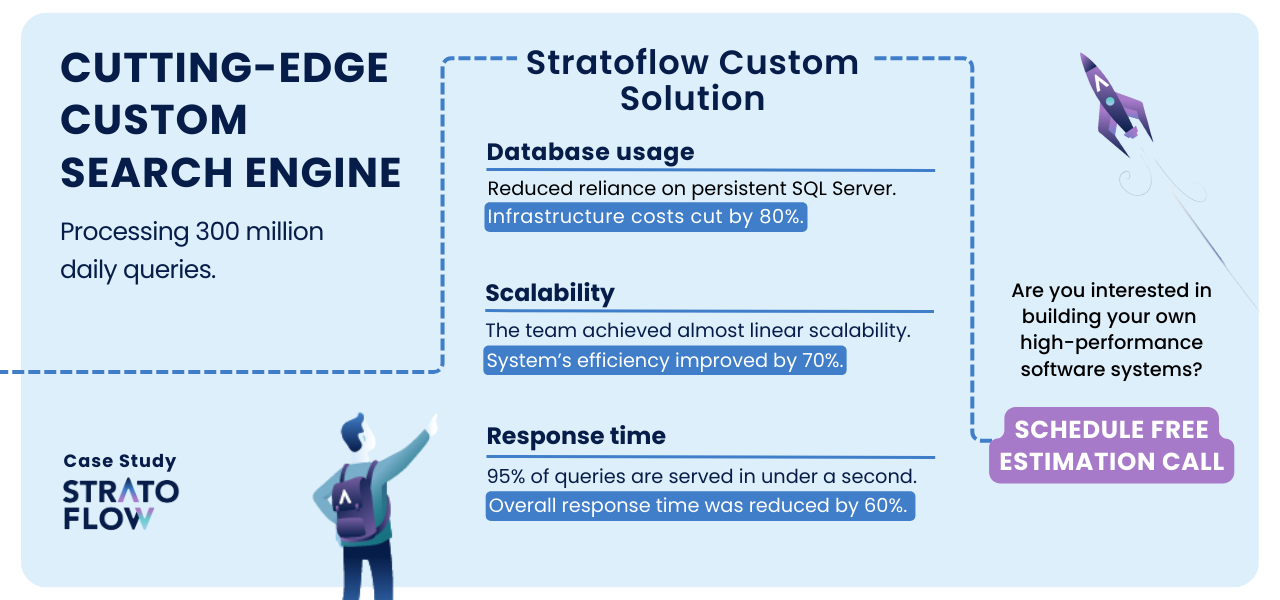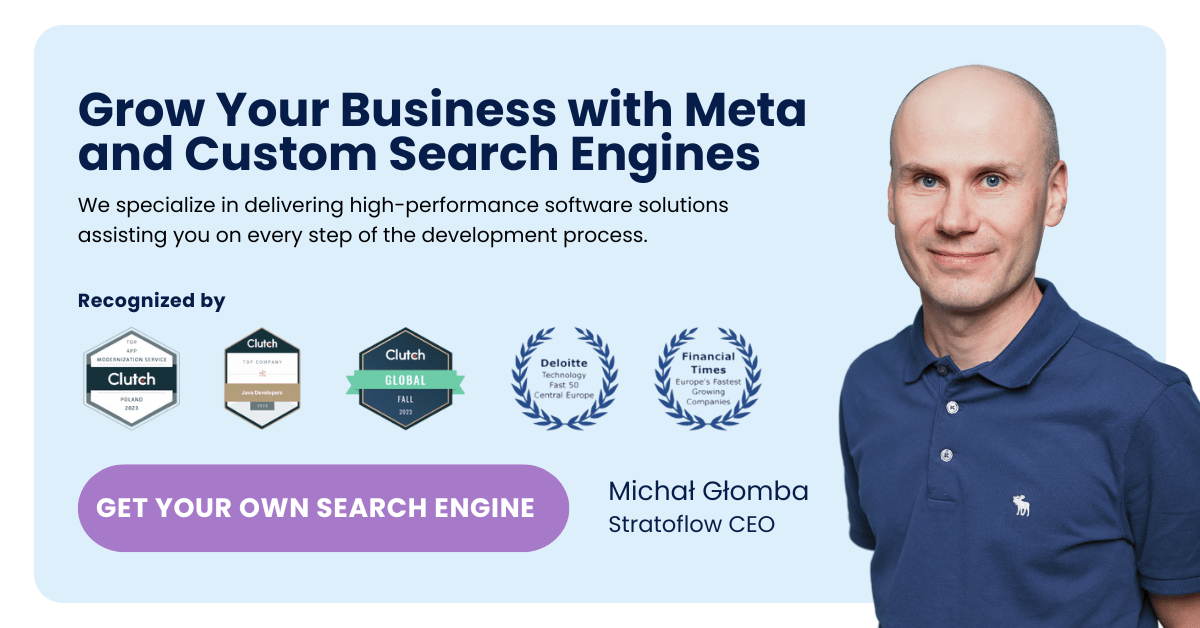
Meta Search Engine: Ultimate 2024 Guide
For most online users, the first thing that comes to mind when they hear search engine is Google.
That’s hardly surprising, since it’s by far the largest search engine in the world.
But metasearch engines have been around for a long time, probably longer than Google itself.
What are they and what value do they provide? In this guide, we’ll take a closer look at these advanced software tools that play an incredibly important role in specialized markets like travel and real estate.
What are Meta Search Engines?
A meta search engine is a type of search engine that aggregates results from multiple search engines, presenting users with a consolidated list of search results from multiple sources.
Unlike traditional search engines, which crawl the Web directly to index pages, meta search engines send user queries to multiple search engines in real time.
They then aggregate and filter the responses to display the most relevant results. The term “meta” indicates that these search engines operate at a higher level, working across multiple other search engines rather than within their own index.
For example, a user searching for information on “quantum computing” using a metasearch engine would receive results from search engines such as Google, Bing, and Yahoo, all within a single interface.
This approach allows users to benefit from the strengths of different search algorithms and databases, potentially providing a broader perspective and more comprehensive search results.
Is Google a Meta Search Engine?
No, Google is not a metasearch engine.
Google is one of the major search engines that directly indexes and crawls the web to return results.
Unlike metasearch engines, which aggregate results from various other search engines, Google uses its own algorithms and database to generate search results.
What Does a Meta Search Engine Do?
A meta search engine works by querying multiple major search engines simultaneously and then aggregating the results into a unified list for the user.
It acts as an intermediary, leveraging the search capabilities of engines such as Google, Bing, and Yahoo without maintaining its own index of the Web.
Meta search engines are often used in situations where users are looking for a broader range of information or need to compare results across different search engines. This is especially useful in markets where all kinds of data must be compiled to provide users with a good comparison.
By submitting a single query to multiple sources, a metasearch engine can provide a more diverse set of results, reducing the likelihood of missing important information that might be overlooked by individual search engines.
In the travel industry, meta search engines are often used to help consumers compare prices and options across different booking platforms.
A prime example is the website Kayak, which acts as a meta-search engine for flights, hotels, car rentals, and vacation packages.
When a user searches for a flight on Kayak, the platform simultaneously queries multiple travel booking sites such as Expedia, Priceline, and direct airline websites.
It then aggregates the results and displays them in a unified interface where users can compare prices, schedules, and other relevant factors.
For consumers, this is a more efficient way to find the best deals and options without having to visit each travel site individually.
By pulling data from multiple sources, travel metasearch engines can provide a comprehensive view of available travel options, helping users make informed decisions quickly.
What are Other Industries That Benefit From Metasearch Engines?
Meta search engines can be used in a wide range of industries, especially those where comparison shopping, data aggregation, and multiple sources of information are valuable to consumers. Some key industries where meta search engines are commonly used include:
- Travel and Hospitality: As mentioned earlier, in the travel industry, travel meta search engines like Kayak, Skyscanner, and Trivago aggregate data from various booking platforms, allowing users to compare prices for flights, hotels, and rental cars.
- E-commerce and Retail: Meta search engines like PriceGrabber or Google Shopping compare prices and product availability across different online retailers, helping consumers find the best deals on a wide range of products.
- Real Estate: Websites like Zillow or Realtor often function as meta search engines for real estate, pulling property listings from various real estate databases, MLS (Multiple Listing Services), and brokerage websites to provide a comprehensive view of available properties.
- Job Search: Meta search engines like Indeed or SimplyHired aggregate job postings from company websites, job boards, and staffing agencies, making it easier for job seekers to find opportunities across multiple sources with a single search.
- Fintech: In finance, meta search engines like Bankrate or NerdWallet compare rates and terms for loans, credit cards, insurance, and other financial products from different providers, helping consumers make informed decisions based on a broad range of options.
Are you operating in one of these industries?
Good news!
You can also introduce metasearch functionality within your online presence to let you aggregate information from multiple sources and provide you with long-term cost-effectiveness!
Get your own custom metasearch engine!
Building a Custom Meta Search Engine to Support Your Business
Building custom meta search engines in various business fields provides immense value by offering tailored solutions that precisely address the unique challenges of each industry.
At Stratoflow, we specialize in metasearch engines, leveraging our expertise to create highly efficient and scalable platforms.
For example, one of our outstanding projects involved building a travel search engine for a major UK hotel booking aggregator.
This custom system was designed to handle over 300 million queries per day, a testament to its robustness and scalability.
We achieved this by using an innovative in-memory data grid platform that enables near-linear horizontal scalability, significantly improving performance and reducing infrastructure costs.
The result was not just a search engine, but a powerful tool that enabled our client to scale their business, improve user experience, and maintain competitive pricing and availability in real time.
Are you ready to take your business to the next level with a custom metasearch engine?
Let us help you build a solution that is tailored to the needs of your industry, ensuring unparalleled performance and scalability.
With our extensive experience, we focus on creating systems that can handle massive queries while optimizing cost and user experience.
Contact us today to discuss how we can build a powerful meta search engine that drives growth and success for your business.
How Does Meta Search Engines Work?
Based on our experience in developing high-performance metasearch engines, particularly in the travel industry, it’s essential to understand the intricate workings of these systems.
Metasearch engines operate through a series of sophisticated processes that ensure users receive the most accurate and timely results.
Let’s delve into the core components of how these systems function.
Data Collection
The first step in a metasearch engine’s operation is data collection.
Unlike a traditional single search engine, a meta-search engine does not maintain its own database of indexed pages.
Instead, the meta search engine searches through and dynamically collects data from multiple sources. It by sending user queries to multiple external data sources, such as other search engines or specialized APIs.
This process requires real-time communication with these sources, retrieving up-to-date information on prices, availability, or other relevant metrics.
The system must be capable of handling multiple simultaneous connections to ensure that it gathers all necessary data efficiently.
Data Processing
Once the data is collected, the next critical step is data processing.
This phase involves several tasks, including filtering out irrelevant or duplicate results, ranking the data based on relevance, and applying specific algorithms to ensure that the most pertinent information is prioritized.
Data processing also requires handling various data formats and structures, necessitating robust parsing and normalization techniques.
This step is computationally intensive, particularly when dealing with large datasets or complex queries, underscoring the importance of optimized algorithms and efficient data handling strategies.
Real-Time Calculation
In industries such as travel, real-time calculations are essential.
Meta search engines must dynamically compute prices, availability, and other variables, often adjusting for factors like exchange rates or inventory levels.
To achieve this, advanced in-memory data grids and caching mechanisms are employed, enabling the system to perform calculations swiftly without excessive database queries.
As demonstrated in our travel search engine project, maintaining low latency while processing high volumes of data is crucial. This ensures users receive up-to-the-minute accurate results without experiencing delays.
For us performance in metasearch engines is crucial. Check it out for yourself:
Custom high-performance metasearch engines
Displaying Results
The final step is displaying the results to the user.
After processing, the data needs to be presented in a coherent and user-friendly format. This involves sorting and organizing the information, typically in a manner that allows for easy comparison, such as by price or rating.
To ensure quick display times, especially under heavy user loads, meta search engines utilize performance optimizations like asynchronous data loading, parallel processing, and efficient frontend technologies.
The goal is to deliver a seamless user experience where results appear almost instantly, even as the system handles numerous queries in the background.
By focusing on these critical processes, we’ve been able to build meta search engines that not only meet the technical demands of high-performance environments but also enhance the user experience, as illustrated in our case study.
Performance and scalability are at the core of these systems, ensuring they can handle the complexities of modern data aggregation and real-time processing.
Top Meta Search Engine Examples
Given our extensive experience in building high-performance meta search engines, it’s valuable to look at some of the top meta search engines in the market today.
These platforms aggregate data from various sources to provide users with comprehensive search results. Here are three notable examples:
Dogpile

Dogpile is the first meta search engine, originally launched in 1996.
It aggregates results from several search engines, including Google, Yahoo, Bing, and more, to provide a comprehensive list of search results.
Dogpile acts as a single platform where users can access a wider array of information without having to search on multiple platforms individually.
Pros:
- Combines results from multiple search engines, providing a broader range of information.
- Supports various search types, including images, audio, video, and news.
Cons:
- May present redundant results due to overlapping content from different sources.
- Ads and sponsored links can sometimes clutter search results.
Startpage

Startpage brands itself as “the world’s most private search engine.”
It functions as a meta search engine by pulling results primarily from Google but with a strong emphasis on user privacy.
Unlike traditional search engines, Startpage does not track user data, store personal information, or target users with ads based on their search history.
Pros:
- Strong focus on privacy, adhering to European Union privacy standards.
- Offers all standard search functionalities, including news, directory, and video searches.
Cons:
- Limited additional features compared to more mainstream search engines.
- Reliant on Google for search results, which may limit the diversity of perspectives.
MetaCrawler
MetaCrawler is a historic metasearch engine that was initially developed at the University of Washington.
It pulls together search results from multiple search engines, offering a variety of search options including semantic search.
Pros:
- Provides comprehensive search results by aggregating data from multiple engines.
- Known for its simple and easy-to-navigate interface.
Cons:
- The interface may seem outdated compared to modern search engines.
- Results can sometimes be less relevant due to the broad aggregation of data.
Related Posts
Thank you for taking the time to read our blog post!



